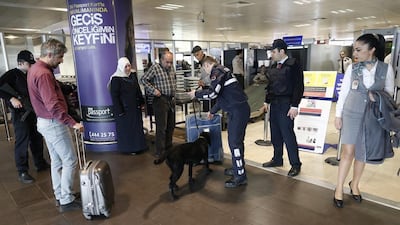Airports are set to introduce a raft of new screening measures around terminals in the wake of last week’s terror attacks in Brussels, which could add hours to check-in times.
ISIL said it carried out the suicides attacks on the city’s airport and metro that left 31 dead and 300 wounded last Tuesday.
Now airports worldwide are reviewing landside security and screening procedures, which could have a dramatic effect on the design of the areas in and around terminal buildings where passengers arrive before checking in.
“We do foresee spending on security and surveillance at airports becoming the focus in the coming months. We may also expect knee-jerk steps being taken, which may inconvenience travellers, airline staff, flight crew and arriving and departing flights,” said Mark Martin, the chief executive of Dubai’s Martin Consulting. “Given the world situation at the moment, clearly we need to comply.”
Analysts say the extra costs associated with new security measures will be a blow to the aviation industry, which had this year hoped to emerge from a prolonged period of turbulence helped by falling aviation fuel bills.
Airports and airlines already spend heavily on terminal security measures. Airport Council International Europe, which represents more than 500 airports in 45 European countries, estimates security costs between its member airports run to €4.2 billion (Dh17.2bn) a year.
"The danger to the aviation community is that imposing blanket security restrictions will hit the operational pace of airports, hinder the flow of goods and people, and cause economic damage to the airline industry," said Ben Vogel, the editor of IHS Jane's Airport Review. "That in itself would be a kind of victory for terrorism."
In western Europe, public airport areas are relatively open when compared to the Middle East and Africa, where travellers’ documents and luggage are often checked before they are allowed inside the airport building. Istanbul and Moscow also check arriving passengers at terminal entrances. Dubai International Airport declined to comment on security issues, while Abu Dhabi International Airport was not immediately available for comment.
Covert explosives-detection technologies installed around the entrances to terminal buildings might be one of the measures that airports will consider after last week’s suicide attacks in Brussels, Mr Vogel said. Additional passenger screening at the terminal entrance is another measure that could be undertaken, effectively pushing the security search zone further into the landside areas.
Such measures could require major physical reconfiguration to the terminal, with significant associated costs that would also extend the time needed to process arriving passengers.
“Airports, airlines and regulators know that security is still the single biggest stress point for passengers, so they need to consider their next steps carefully in the light of the Brussels attack,” Mr Vogel said.
Such measures might effect secondary airports more than the region’s so-called super-connector hubs including Dubai, Doha and Abu Dhabi, where a large proportion of passengers are in transit.
Addison Schonland, the founder of the US commercial aviation consultancy AirInsight, said passengers will have little choice but to accept the changing realities of air travel and factor in the extra time needed to catch a flight accordingly.
“Passengers will simply have to get used to things such as profiling and inspections. It is annoying and slows things down. But the alternative is way worse,” he said.
selgazzar@thenational.ae
Follow The National's Business section on Twitter

